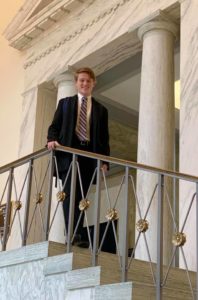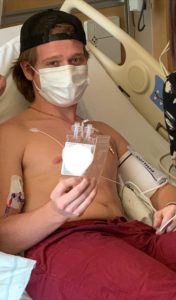I can’t die, I’m busy: Meet HEADstrong Hero Jace Ward
By Jen Hildebrand
“I can’t die, I’m busy.”
Those are the words that Jace Ward has lived by for the last 19 months since being diagnosed with DIPG.
At the time, Jace was living the life of a typical college student. The youngest of three children, the then-20 year old business major at the University of Kansas was a former high school football player and volunteered with special needs students.
That all changed in the spring of 2019. That February, Jace had walked away from a horrible rollover car accident near his hometown of Wamego, Kansas, but a few weeks later started experiencing vision problems in the periphery of his left eye. Doctors thought it was an injury to the muscles surrounding his eye or something similar, possibly from the accident, and sent him for a MRI and additional tests. What they found was much more serious.
On May 17, 2019, following multiple rounds of tests and uncertainty, Jace was diagnosed with Diffuse Intrinsic Pontine Glioma, or DIPG. DIPG, rarely found in adults, is a tumor that starts in the pons of the brain, a portion of the brain stem. It is typically in-operable due to the location, as that area controls breathing, heart rate and the nerves and muscles that control the ability to hear, walk, talk and eat.
With that diagnosis, Jace was told that the life expectancy of DIPG was nine months. That would have been February 17, 2020, one day shy of his 21st birthday.
Facing that knowledge, as well as, symptoms that were advancing by the day, Jace’s mom, Lisa, set out to find the best treatment options for him. After extensive research and consultation with doctors, the family decided to have a biopsy done on the tumor. The biopsy, performed at the University of California, San Francisco hospital, determined that Jace had the mutation H3K27M, which is found in approximately 70% of all DIPG cases. With that revelation, Lisa began the battle to get Jace included in a trial for a new drug that focused on blocking dopamine from feeding the tumor’s growth.
After months of roadblocks due to Jace’s age and multiple other factors, he was finally able to participate in Expanded Access Protocol of the drug Onc201 by Oncoceutics, Inc. beginning in early September, 2019. The family saw improvement in Jace’s condition and by January of 2020 the tumor had begun to shrink. For Jace, the drug was tolerable with very few side effects.
Since the drug trial, Jace, as well as Lisa, have been focused on doing what he can to help other families that are going through the same situation. Jace has twice traveled to Washington, D.C., including while undergoing radiation treatments, to speak to lawmakers about DIPG and the lack of awareness and funding for research for it and other pediatric cancers.

In February of 2020, it was an honor for Jace to be a key speaker at the first ever DIPG Advocacy Briefing to Congress, just before celebrating his 21st birthday and outliving his stated life expectancy. In addition through the efforts of Jace and countless others, HR Res 114 designating May 17 as the DIPG Awareness Day now has 213 cosponsors and is awaiting a vote on the house floor. The Senate has also recognized DIPG Awareness Day the last two years. Since, Jace has moved on to work on the passage of the Gabriella Miller Kids First Data Initiative 2.0 legislation. During Covid protocol, his advocacy is through zoom calls with Ellyn Miller and other cancer families. The legislation would use pharmaceutical fines to fund childhood cancer research and data initiatives.

Through his work with lawmakers and other organizations, Jace currently has an internship with the Emerson Collective and is working with Reed Jobs to assist in bringing about more research funding and policy direction for rare brain cancers.
“As I’m getting better and better, when my body feels better I’m going to take this as a real personal challenge, to try to knock off a lot of the problems that my family faced,” Jace said about future plans. “That will hopefully make it a lot easier for cures to be found but also for families to get to the cures and to have access to possibilities. A lot of times these trials provide help. June of this year was a very dark time for me because I could feel my body losing its strength, I could feel my eye starting to not work and it made me question things. What I didn’t really have (at that time) was hope because I knew that the medicine I was on wasn’t working and when something stops working, DIPG attacks very aggressively. What the T Cell trial has provided for me is hope and I see the importance of that. Even if it doesn’t work, I see the importance of how having access to the trial allows me to live my life regularly now and not have to worry as deeply about what is going to happen because at least i know i have a plan.”
Life isn’t all treatments, trials and lawmakers for Jace. Throughout this journey, he has continued forward with his education. He is currently a senior at Kansas State University, where he transferred during his treatments, and would like to attend law school following graduation to continue to work on raising awareness for cancer research and funding. Through his grant from HEADstrong, Jace will be able to cover living expenses at his new apartment at KSU and help offset some of the expenses that his family has incurred during treatment.
“When I was first diagnosed, it was one of the original talks that my mom and I had, one of those hard conversations, about what do I want,” Jace explained. “I remember being scared, not about dying, because I feel like that’s a natural thing – everybody’s going to have to do it eventually. I was more scared about dying before I made an impact. I saw these problems and they obviously hit me. I had this conversation with my mom about how I was scared about not having the opportunity to say something about this and do something about this and now I’m blessed with some borrowed time as I like to say and am able to help.”
After all, he’s too busy to die.

D
O
N
A
T
E